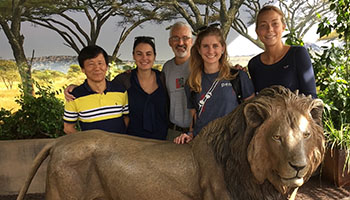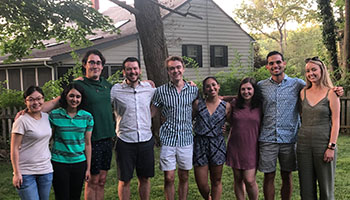HOW CAN WE HELP YOU? Call 1-800-TRY-CHOP
In This Section
Faculty Spotlight: Meet Our 2020 Excellence in Mentoring Award Winners

Akiva Cohen PhD (center) with trainees at the San Diego Zoo.
Editor’s Note: This Q&A kicks off a monthly Cornerstone series in which we sit down with faculty members at Children’s Hospital of Philadelphia Research Institute to learn more about their research and roles. Through these spotlights, our readers have the opportunity to meet the diverse, dedicated, and distinctive individuals who lead our research community in our mission to improve children’s health. Stay tuned for more from our Faculty Spotlight series throughout this year!
For Akiva Cohen, PhD, and Joseph Zackular, PhD, recipients of the 2020 Excellence in Mentoring Trainees Award, mentors do more than just advise trainees on their scientific work: They provide a “second family,” a “support system,” and a sounding board for all the questions, quirks, and concerns that no doubt come with a career in academia.
Awarded every year to select Research Institute faculty members, the Excellence in Mentoring Trainees Award recognizes individuals who commendably guide the professional development and training of postdocs and research fellows at CHOP. From building a research environment set for success to empowering trainees to think outside the box, Drs. Cohen and Zackular no doubt fit the bill and then some, as they share their unique wisdom and knowledge with trainees while also conducting innovative and exciting research.
Dr. Cohen, an investigator in the Department of Anesthesiology and Critical Care Medicine and the Minds Matter Concussion Program, studies how traumatic brain injuries alter hippocampal and cortical circuitry to result in cognitive impairment. Dr. Zackular, an investigator in the Department of Pathology and Laboratory Medicine, examines how interactions between the host, gut microbiota, and pathogenic microbes influence human health. In this Q&A, we sat down with Drs. Cohen and Zackular to learn more about why the act of mentoring can reap benefits for trainees, themselves, and pediatric research as a whole.
How did you get involved in mentoring research trainees?

Joseph Zackular, PhD (fourth from left) with his trainees.
Dr. Zackular: I became passionate about mentoring research trainees back when I was a trainee myself. I was lucky to have truly phenomenal mentors during my training — both formal and informal. I stay in contact with all of my mentors to this day, and they continue to play an important role in my career and life. Being able to pay this forward and help young scientists reach their potential is something I take pride in. The trainees are by far the best part about my job.
Dr. Cohen: Science is a team effort, and trainees at every level, from technicians to postdoctoral fellows, to graduate, undergraduate, and even high school students play a significant role in hypothesis testing by doing experiments and analyzing data. In short, trainees are the driving force making the lab productive, and they are integral to moving science forward.
Can you describe what it’s like working with your research trainees?
Dr. Zackular: I have been incredibly lucky to have had the opportunity to work alongside a group of such talented young scientists. Working with these brilliant research trainees is exciting, inspiring, and most importantly fun. They teach me something new every day, and their infectious excitement for science keeps me motivated to be the best mentor I can be.
When I reflect on the last two years in the lab, what jumps out to me is the lab culture. My team has built an incredibly supportive, team-oriented, open, and accepting culture that fosters high level science together with a healthy and fun work environment. This supportive lab culture breeds the best science and makes research fun.
Dr. Cohen: They usually start out fumbling, as everything is new to them. Working with trainees, whether doing experiments or discussing their data, you get to see in real time how they improve and hone their scientific and technical acumen. Their lab meeting presentations improve quickly, and their scientific questions become more informed. There is a maturation process that occurs. As trainees gain experience, they start asking the newer trainees tougher, probing questions about data and techniques. Often, trainees that have been in the lab ask tougher questions than I do.
What is your favorite part about mentoring research trainees?
Dr. Zackular: I enjoy going through the scientific process alongside my research trainees. I love hearing about joining in their excitement as they make breakthroughs and discoveries. However, I also love racking our brains to figure out why that one experiment didn’t work or working together to explain weird or unexpected results. Working with them each day, and watching them develop into outstanding and independent scientists is incredibly rewarding.
Dr. Cohen: Playing a significant role that allows trainees to become proficient in a new technique and how to attack a scientific problem. They initially need to understand how hard they have to work to learn a technique. I have a lot of energy and enthusiasm for science, and sharing my enthusiasm seems to invigorate my trainees. I enjoy watching the moment a trainee gets excited when they have successfully conducted an experiment and wanting to show me data they have just generated.
Why is mentoring so important?
Dr. Zackular: Mentoring is important because it provides the foundation for trainees to succeed. The job of a mentor is to empower trainees to reach and exceed their goals and become independent thinkers with unique voices. Mentors are the support systems for trainees, and good mentoring builds the environment and community that fosters success. An effective mentor listens just as much as they speak and becomes whatever is needed by the trainee.
Dr. Cohen: Trainees are the life blood of science. They are the ones who will continue to move science forward. I hope they have also learned the value of mentoring and pass it on to their own trainees.
As an excellent mentor, can you offer any pieces of advice to research trainees?
Dr. Zackular: First of all, it’s important to acknowledge that being a trainee is tough! There is a lot of internal and external pressures that can make this time in your career very stressful. Try to step back and remember where you are and how you got here. You should be proud! Next, be sure to make the most of your relationship with your mentor. Communication is key, and just like any other relationship, you should continuously work to make your relationship with your mentor the best it can be for you. Be honest, speak up for yourself, and don’t be afraid to ask for the things that you need to succeed.
Additionally, it is important to remember that mentorship doesn’t stop with your principal investigator. The broader scientific community at Penn and CHOP is truly special and uniquely supportive. Be active in the community, and seek our mentorship from other faculty, trainees, and staff. This can be a scientific, personal, and career mentorship. Finally, enjoy being a trainee and have fun. You will look back at this time in your career fondly and wish you could come back — promise!
Dr. Cohen: Enjoy your time as a trainee. It is the only time when you get to make mistakes with little or no consequences and get to solely focus on science. Never be afraid to ask questions. There are no stupid questions. It is stupid not to ask. You need to be able to speak openly with you PI; there will come a time when you need to discuss experiments not working or data that may not make sense. Choosing a mentor and a lab is a very consequential decision, as your PI and lab mates will be your secondary family.
Learn more about these mentors’ scientific endeavors at January’s Faculty Luncheon, Jan. 19.